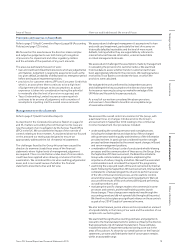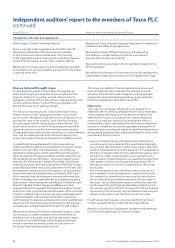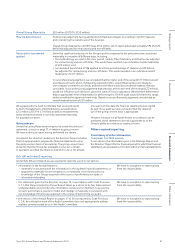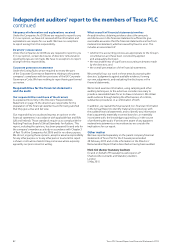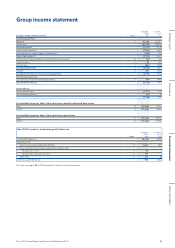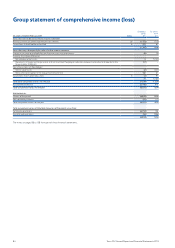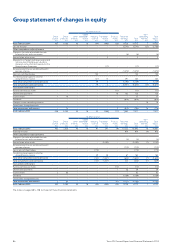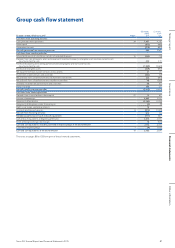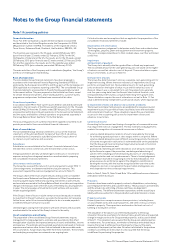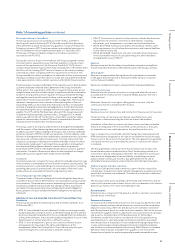Tesco 2015 Annual Report Download - page 81
Download and view the complete annual report
Please find page 81 of the 2015 Tesco annual report below. You can navigate through the pages in the report by either clicking on the pages listed below, or by using the keyword search tool below to find specific information within the annual report.
Area of focus How our audit addressed the area of focus
Provisions and reserves in Tesco Bank
Refer to page 37 (Audit Committee Report), page 88 (Accounting
Policies) and page 125 (notes).
We focused on this area because the directors make complex
and subjective judgements over both timing of recognition
of provisions for impairment and other regulatory matters
and the estimate of the quantum of any such amounts.
The areas we particularly focused on were:
• loan and credit card impairment provisions which are judgemental
and material. Judgement is required to assess factors such as the
loss given default, probability of default and loss emergence period
before arriving at an impairment provision;
• provisions for customer redress (PPI and Consumer Credit Act)
which is an area where there continues to be a high level
of judgement with changes to key assumptions as actual
experience is taken into consideration having the potential
to materially alter the level of provision recognised; and
• Tesco Underwriting Limited insurance reserving which
continues to be an area of judgement, with a number of
assumptions inputting into the overall reserve amounts.
We assessed and challenged management’s assumptions for loan
and credit card impairment, particularly the level of recovery on
historically defaulted receivables and the level of more recent
defaults, testing whether they are supportable by reference to
internal historical financial information, external market data
or robust management rationale.
We assessed and challenged the assumptions made by management
in calculating the provisions for customer redress. We examined
historical data to assess whether trends in customer claims have
been appropriately reflected in the provisions. We read legal advice
received by Tesco Bank to corroborate the basis on which the
provisions were calculated.
We evaluated the work performed by independent actuaries
and challenged the key assumptions the directors have made
for insurance reserving by using our market knowledge of the
UK Motor and Household insurance products.
As a result of our work we considered the above provisions
and reserves in Tesco Bank to be within an acceptable range
of reasonable estimates.
Management override of controls
Refer to page 37 (Audit Committee Report).
As described in the Corporate Governance Report on pages 32
and 33, matters surrounding the commercial income issue are
now the subject of an investigation by the Serious Fraud Office
(SFO) in the UK. We considered the impact of the override of
controls relating to those matters. As explained above we focused
on this area and our testing was designed to ensure we
appropriately addressed the risk of material misstatement.
The challenges faced by the Group this year have caused the
directors to examine closely those areas of the financial
statements where higher levels of management judgement
are required. There is a risk that an undue level of conservatism
could have been applied when drawing conclusions from this
examination. We considered this risk when auditing judgemental
areas, and in our overall review of whether the financial
statements presented a true and fair view.
We assessed the overall control environment of the Group, with
a particular focus on changes introduced since the Group’s
announcement in September 2014 relating to the commercial
income misstatement. Our procedures included:
• understanding the overall governance and oversight process
including the independence and objectivity of those charged
with governance and the quality and timeliness of the information
provided to them. In particular we considered how the oversight
process had been impacted by the several recent changes in Board
and senior management positions;
• consideration of the Group’s code of conduct and whistle-blowing
processes and the communication of these across the Group. Since
the September 2014 announcement, the Board has initiated a
Group wide communication programme emphasising the
importance of culture, integrity and ethics. We read the associated
communications and considered the impact of the programme;
• examining the scope and results of the work carried out by Internal
Audit. Following the September 2014 announcement, Internal Audit
completed its scheduled programme of work to perform a review
of the UK commercial income process, and to examine controls
around other areas of significant accounting judgement. We took
account of the results of this work when planning and performing
our audit procedures; and
• evaluating the specific changes made to the commercial income
processes and controls, and the staff training used to launch
these changes. These changes were made mid-way through the
accounting period and did not operate fully throughout the period.
We therefore did not place any significant reliance on these controls
as part of our 2014/15 audit of commercial income.
We also tested manual journal entries and incorporated an element
of unpredictability in the timing of our work and the selection of our
samples into our testing plans.
We examined the significant accounting estimates and judgements
relevant to the financial statements for evidence of bias by the directors
that represented a risk of material misstatement. These estimates
included the areas of impairment and provisioning as set out in the
areas of focus above. As shown by our overall opinion on the financial
statements, we were satisfied that the level of conservatism remains
within an acceptable range.
79Tesco PLC Annual Report and Financial Statements 2015
Other informationGovernance Financial statementsStrategic report












